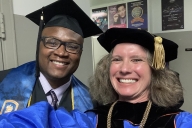You have /5 articles left.
Sign up for a free account or log in.

georgeclerk/e+/Getty Images Plus
“We study history not to be clever in another time, but to be wise always.” —Marcus Tullius Cicero
It is not groundbreaking news that the political and social divisions in our country are immense. While most of us care about the same things—safety, security, economic well-being, family, faith and equal justice—I believe our news outlets and politicians emphasize our differences to further their own interests and agendas, rather than the beliefs that we hold in common. But that’s a story for another day.
My immediate concern, as someone who leads the nation’s oldest higher education accrediting agency, is to ensure that the political and social agendas that predominate today, on both the left and the right, do not alter what have been the twin guiding principles that have helped make American colleges and universities the envy of the world. Those principles are academic freedom and the right of institutions to be free from governmental overreach.
Today, both of these long-standing principles, principles that have served us so well and distinguished the United States from so many other countries, are at real risk.
Let me be clear: the threats to academic freedom, as I see them, emanate from both the left and the right sides of the political spectrum, and they are not confined to our borders. Across the globe, violations of the principle of academic freedom are both pervasive and frightening. In Hungary, government authorities attacked the Central European University so fiercely that the university relocated to Vienna. Apparently, independent educators were deemed incompatible with an illiberal political regime. In Turkey, academic discourse has been constricted in every instance where it’s found to be contrary to the de facto principles determined by political norms.
Here at home, the principles of academic freedom and institutional independence are enshrined in the standards of all of the (historically) regional accreditors. The responsibility for the development of—and the academic freedom to deliver—academic programs rests squarely with the faculty, not the president, not the governing board and absolutely not the government. As proof, here are just two of the relevant standards from the New England Commission of Higher Education:
3.15 The institution places primary responsibility for the content, quality and effectiveness of the curriculum with its faculty. Faculty have a substantive voice in matters of educational programs, faculty personnel and other aspects of institutional policy that relate to their areas of responsibility and expertise.
6.12 The institution protects and fosters academic freedom for all faculty regardless of rank or term of appointment.
Educational gag orders issued by a Board of Trustees or passed into law by a state Legislature—those that would prohibit a faculty member from teaching certain events or lessons from history, for example—would certainly appear to violate the above standards. Similarly, a directive from a governing board that requires faculty to teach American history courses using only “The 1619 Project” would violate our standards as well.
While attacks on academic freedom from governmental authorities are particularly dangerous because they are undergirded by the force of law, censorship of speech on campuses is a serious threat as well.
We study history, hopefully, to act more wisely than generations before us. That history ought to teach us something about the inappropriateness and the dangers of attempts to control curricula from above and also the temporality of such attempts. After all, who is to define what can be taught and what cannot? Certainly, in this great country of ours, not the government.
It may very well be the job of accreditors, as unpopular as it may be with some, to hold our institutions—and those who would choose to control what’s taught in them—to the long-standing principles that have served us all very well.
Found In
More from Views








